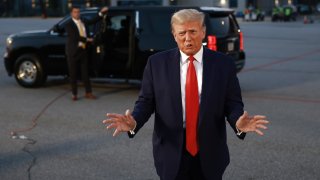
- A judge rejected an effort by Donald Trump to dismiss his criminal election interference case in Georgia on grounds that the indictment violates his free speech rights.
- Trump and 14 of his co-defendants in the case argued that the indictment brought by Fulton County District Attorney Fani Willis encroached on their right to challenge Trump's 2020 election loss to President Joe Biden.
- "Even core political speech addressing matters of public concern is not impenetrable from prosecution if allegedly used to further criminal activity," Judge Scott McAfee wrote in rejecting the dismissal bid.
A judge on Thursday denied an effort by Donald Trump to dismiss his criminal election interference case in Georgia on grounds that the indictment violates his free speech rights.
The former president and 14 of his co-defendants in the case argued that the indictment brought by Fulton County District Attorney Fani Willis encroached on their First Amendment right to challenge Trump's 2020 election loss to President Joe Biden in the state.
But their speech is alleged to have been made "in furtherance of criminal activity," Judge Scott McAfee wrote in his 14-page ruling in Fulton County Superior Court.
"Even core political speech addressing matters of public concern is not impenetrable from prosecution if allegedly used to further criminal activity," McAfee wrote.
The judge noted that he was interpreting the indictment "liberally in favor of the State" as is required during the pretrial period.
Get Tri-state area news delivered to your inbox.> Sign up for NBC New York's News Headlines newsletter.
The defendants argued that their speech about Georgia's 2020 election results was political and that they cannot be prosecuted for making even false political statements.
Money Report
But the charges do not hinge solely on whether their election claims were true or false, McAfee wrote.
"Instead, the indictment avers throughout that the Defendants acted 'willfully' and 'knowingly,' and that they impacted matters of governmental concern," the judge wrote.
"These are not legal conclusions, but issues of fact," McAfee wrote in the ruling. "The allegations that the Defendants' speech or conduct was carried out with criminal intent are something only a jury can resolve."
Trump's attorney Steve Sadow said in a statement to NBC News that the defendants "respectfully disagree with Judge McAfee's order and will continue to evaluate their options regarding the First Amendment challenges."
The ruling marks the latest legal loss for Trump, who is running for president while facing 91 criminal charges in four separate cases.
On Wednesday, a New York judge denied one of Trump's requests to delay his upcoming criminal hush money trial, which is set to begin April 15.






